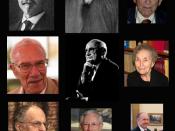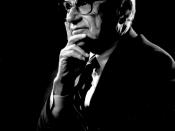Milton Friedman: His Economic Theories in Action in the Twenty First Century
Milton Friedman was an American economist who contributed to the field of macroeconomics and microeconomics, while promoting free markets and laissez-faire capitalism. Milton Friedman is most well known for his advocation of free markets and his hypothesis on permanent income. In this paper, I have critically analyzed a few of Milton Friedman's investigations and work and their applicability as well as importance in today's time.
In Capitalism and Freedom, Friedman makes the case for economic freedom as a precondition for political freedom. Friedman says that government has three primary functions. Government should provide for military defense of the nation, should enforce contracts between individuals and should protect citizens against crimes against themselves or their property. Ceteris paribus, a government that plays a limited role in the business and economic arena is more likely to allow for advancements in the business world and to allow for economic development.
In essence, Thomas Jefferson's popular saying, "Government is best that governs least" appears to have influenced this particular theory of Milton Friedman.
I strongly feel that in light of the political tension and unrest in the Middle East, particularly, between Palestine and Israel, politicians should adopt Friedman's aforementioned framework. For example, when Milton Friedman visited Israel in 1969, Jordanian money was allowed to circulate alongside Israeli money and their was active trade across the Jordan River. Furthermore, Israeli soldiers, at the time, were in strong support of free markets and non intervention. They saw the benefits of eliminating barriers to the movements of goods, men and capital, which they believed would foster the economic integration of the west bank with Israel. This is obviously not the case between Jordan, and many other Muslim countries in the Middle East today, and Israel.



"Sir" Milton
Why would an American citizen be using the title sir? If he had a KBE, he still wouldn't use the title in front of his name.
0 out of 0 people found this comment useful.